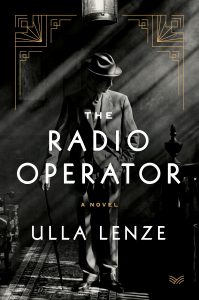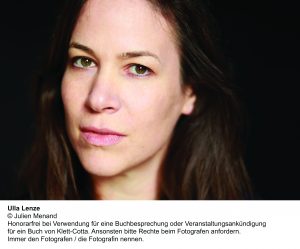To be a Voice. Everywhere. Always: The Radio Operator by Ulla Lenze
 Distinguished German author Ulla Lenze’s most recent novel, now available in English as The Radio Operator (HarperVia, May 2021), revolves around a fascinating, forgotten chapter of history. In 1935, Wilhelm Canaris, the head of Hitler’s Abwehr—the Third Reich’s central intelligence agency—overhauled its foreign espionage units and built up a network consisting mostly of German American spies on U.S. soil. These men and women were originally recruited in Germany. After they returned to in North America, they recruited fellow immigrants to serve as National Socialist collaborators.
Distinguished German author Ulla Lenze’s most recent novel, now available in English as The Radio Operator (HarperVia, May 2021), revolves around a fascinating, forgotten chapter of history. In 1935, Wilhelm Canaris, the head of Hitler’s Abwehr—the Third Reich’s central intelligence agency—overhauled its foreign espionage units and built up a network consisting mostly of German American spies on U.S. soil. These men and women were originally recruited in Germany. After they returned to in North America, they recruited fellow immigrants to serve as National Socialist collaborators.
Six years later, the American government exposed a Nazi spy ring operating on its shores. By December 13, 1941—six days after the attack on Pearl Harbor—every member of the group had pled guilty or been convicted, including the ringleader, Fritz Duquesne. It is still possible to view the mug shots the FBI took of the enemy agents on the Library of Congress Prints and Photographs’ Division website. When studying the grim gallery of portraits, the photo of a young man in the third row, second to the left, catches one’s attention. He looks different from the other prisoners. He has large, dark eyes and an open, trusting expression. His name is Josef Klein.
Josef Klein, it turns out, was Ulla Lenze’s granduncle. The Radio Operator is based on his life.
Ulla Lenze found out about him from her mother, who handed her the letters he had written to his brother Carl over the years. The correspondence inspired Lenze to tackle her first historical novel. From the start, she decided to reveal that Josef Klein was her relative, since she felt that “revealing the relationship seemed important to me as a contribution to the question of how the so-called grandchild generation (i.e. mine) deals with the behavior of their ancestors in Nazi Germany, what narrative modes and attitudes we adopt.
Generally, it is said that the first generation looked condemningly at their mothers and fathers, but later generations are mainly interested in understanding how this criminal regime of Nazi Germany could have come about and why so many people participated. Not with the intention of excusing the behavior, but to prevent history from repeating itself.”
Lenze, whose novels and essays have won her numerous prestigious literary prizes, awards, and fellowships in her native Germany, told me that crafting her granduncle’s story tested her considerable creative abilities: “For the first time, I also had to actively think about a political context, and not just make sure it was an interesting story. I felt a lot of responsibility, especially since Josef Klein is an ambivalent figure, which in addition to being a perpetrator, bears the traits of a victim… It was very important to me that no historical revisionisms creep in. This was a completely new work for me as a writer, and it challenged me a lot.”

She admits to feeling conflicted about her granduncle—a lively correspondent in his letters to her grandfather—whom she portrays as leading a quiet hermit existence in 1930s East Harlem, where he makes his home after arriving in New York. Surrounded by the world’s most vibrant city, Josef sequesters himself in his small apartment, reading Thoreau’s Walden, smoking profusely, and listening to Jazz.
Most importantly, he builds shortwave radios, which enable him to overcome his isolation and provide him with a voice as he communicates with fellow enthusiasts from around the world. Ironically, Josef’s penchant for wireless mechanics brings him to the attention of a Nazi spy group operating in New York, whose members employ the technology he has mastered as a gifted amateur to send secret messages to Nazi Germany.
When asked to speculate why Josef Klein joined the conspirators around Duquesne, Lenze shares an interesting idea. “I think the reasons why Joseph joins the spy ring are a bit tricky. It may have something to do with his… refusal to play the role of the German migrant, which ironically leads to the exact opposite, as he fails to make the timely distinction when the Nazi agents recruit him. In principle, he does not want to be appropriated, wants to be allowed to be apolitical, and the exact opposite occurs.”
Although she originally resisted the description, Lenze now thinks of her granduncle as a “fellow traveler.” She also regards Josef as something of a dreamer, who reads Thoreau’s Walden but ignores its political dimension. His inability to see the reality of the political situation in the 1930s—the fascist German American Bund had its headquarters in Manhattan and organized a mass rally in Madison Square Garden on February 20, 1939 which Josef attends with a friend—constitutes an essential personal weakness, which his love interest Lauren clearly perceives. She embarks on a drastic course of action in order to force Josef to face up to the fallacies in his reasoning—but does he, in the end? If I understood the novel correctly, his vision remains, to some degree, blinkered.
After I told Lenze that the twist she gives the traditional love plot struck me as original, she had this to say: “Personally, I would have very much liked to see such a turn of events for Josef – a love that opens his eyes in every respect. But then it would no longer have been the Josef Klein story that needed to be told. I was also interested in this psychological conflict that occurs between the lovers: How far does loyalty go? Is there a higher loyalty? Lauren makes a decision against Joseph, but even the “against” can be interpreted in a higher sense as a “for.” She wants to protect him from himself. Of course, this is problematic again. So, anyway, the situation is nicely complicated.”
Complicated is the perfect word to describe Josef Klein’s destiny. When he leaves Germany for North America in 1925, he is alone, which was never his intention. His brother Carl was meant to accompany him to the new world, but he suffers a freak accident that prevents him from traveling abroad. Once the reader discovers that the two young men planned to emigrate together, it is not hard to see that Josef, the émigré, draws the short straw. Carl’s injury ensures that he is exempted from war duty, and he marries lovely Edith, with whom he shares a happy home and a family. Josef, in the meantime, endures the fate of the uprooted, unable to form lasting human connections or to settle down permanently. He is first Josef, than Joe, and finally José, the eternal wanderer without a fixed place or identity.
The Radio Operator—the German title is The Receiver, which cleverly hints at Josef’s lack of initiative—is a memorable, wonderful book. Lenze’s prose is particularly evocative when she describes Depression-era New York, its streets alive not only with unbridled human energy, but also considerable racial tension. The city is depicted as at once stimulating and terrifying, enabling the reader to understand how a newcomer from a quiet town in the Rhineland could take fright when encountering its merciless anarchy head-on. On the one hand Josef revels in New York’s freedoms, on the other, he seeks comfort in a movement set on eradicating the city’s diversity. He is torn between the desire for peaceful assimilation and the need to express his individuality beyond the limitations of a nationalist ideology. As a result, The Radio Operator emerges as a stirring portrayal of the modern migrant personality, a compelling study of what it means to be displaced.
About the contributor: Dr. Elisabeth Lenckos serves on the Social Media Team for the Historical Novel Society. She is at work on a novel about several generations of a family in 20th-century Berlin.






